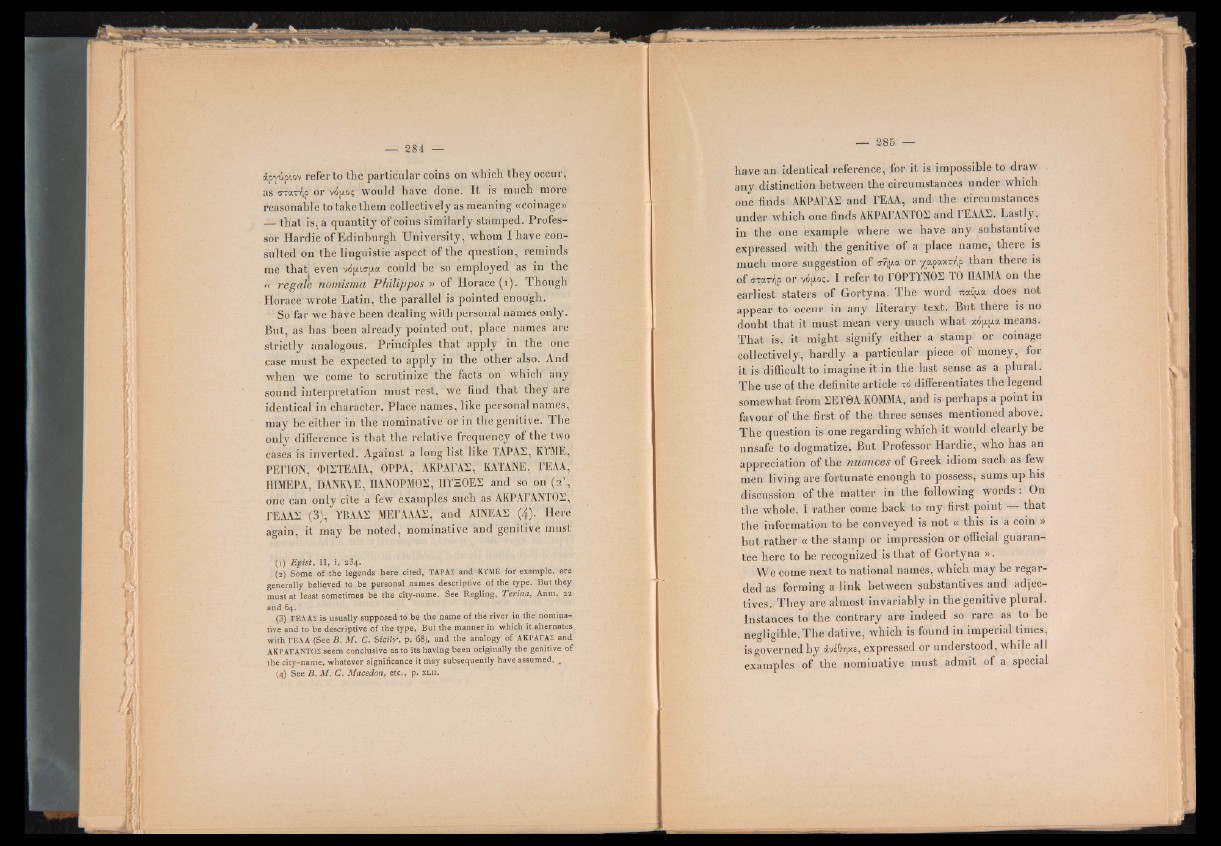
¿pyup'.ov refer to the particular coins on which they occur,
as trra-nip or vopo; would have done. It is much more
reasonable to take them collectively as meaning «coinage»
— that is, a quantity of coins similarly stamped. Professor
Hardie of Edinburgh University, whom I have consulted
on the linguistie aspect of the question, reminds
me that, even vopwpa could be so employed as in the
« regale nomisma Philippos » of Horace (i). Though
Horace wrote Latin, the parallel is pointed enough.
So far we have been dealing with personal names only.
But, as has been already pointed out, place names are
strictly analogous. Principles that apply in the one
case must be expected to apply in the other also. And
when we come to scrutinize the facts on which any
sound interpretation must rest, we find that they are
identical in character. Place names, like personal names,
may be either in the nominative or in tlie genitive. The
only difference is that the relative frequency of the two
cases is inverted. Against a long list like TAPAE, KYME,
PEriON, 'MSTEAIA, OPPA, AKPAEAE, KATANE, EEAA,
HIMEPA, DANK\E, HANOPMOS, IJTHOES and so on (2',
one can only cite a few examples such as AKPArANTOS,
PEAAE (3), YBAAS MErAAAS, and AINEAS (4). Here
again, it may be noted, nominative and genitive must
(1) E p ist. II, i, 234.
(2) Some o f the legends here cited, TAPAS and KYME for example, are
generally believed to be personal names descriptive of the type. But they
must at least sometimes be the city-name. See Regling, Terina, Anm* 22
and 64.
(3) TEA AS is usually supposed to be the name of the river in the nominative
and to be descriptive of the type. But the manner in which it alternates
with TEA A (See B. M . C. Sic ily , p. 68), and the analogy of AKPArAS and
AKPArATSTOS seem conclusive * s to its having been originally the genitive of
the city-name, whatever significance it may subsequently have assumed. .
(4) See B. M . C. Macedort, etc., p. x l i i .
have an identical reference, for it is impossible to draw
any distinction between the circumstances under which
one finds AKPArAE and EEAA, and the circumstances
under which one finds AKPArANTOS and rEAAE. Lastly,
in the one example where we have any substantive
expressed with the genitive of a place name, there is
much more suggestion of or yapaxirrip than there is
of a-ar/.p or vopoq. I refer to POPTYNOS TO HAIMA on the
earliest staters of Gortyna. The word uaipa does not
appear to occur in any literary text. But there is no
doubt that it must mean very much what xoppa means.
That is, it might signify either a stamp or coinage
collectively, hardly a particular piece of money, for
it is difficult to imagine it in the last sense as a plural.
The use of the definite article to differentiates the legend
somewhat from EEY0A KOMMA, and is perhaps a point in
favour of the first of the three senses mentioned above.
The question is one regarding which it would clearly be
unsafe to dogmatize. But Professor Hardie, who has an
appreciation of the nuances of Greek idiom such as few
men living are fortunate enough to possess, sums up his
discussion of the matter in the following words : On
the whole, I rather come back to my first point that
the information to be conveyed is not « this is a coin »
but rather « the stamp or impression or official guarantee
here to be recognized is that of Gortyna ».
We come next to national names, which may be regarded
as forming a link between substantives and adjectives.
They are almost invariably in the genitive plural.
Instances to the contrary are indeed so rare as to be
negligible. The dative, which is found in imperial times,
is governed by ¿vsfb.xe, expressed or understood, while all
examples of the nominative must admit of a special